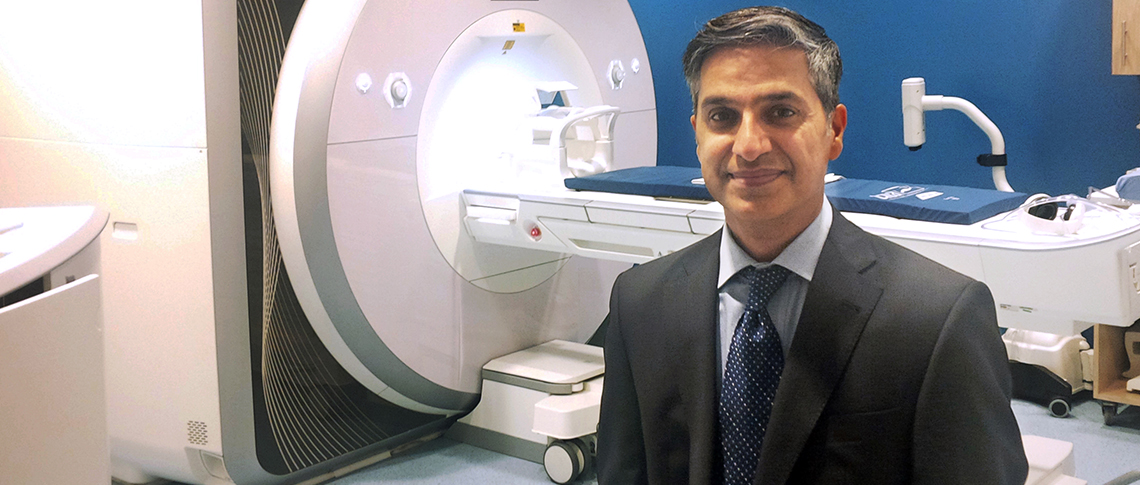
November 19, 2015

Dr. Sanjay Kalra, co-medical director of the Alberta Health Services’ ALS Clinic in the Edmonton Zone, and University of Alberta Professor in the Department of Medicine (Neurology), stands before an MRI (Magnetic Resonance Imaging) machine. With a $2.94M grant from the ALS Society of Canada, Dr. Kalra and his research team will examine the brains of people living with ALS in hopes of developing a better way to detect and ultimately to cure the fatal neurodegenerative disorder.
Story & Photo by Tadra Boulton
Last year’s social-media phenomenon — the ALS Ice Bucket Challenge — raised millions across North America for research into Amyotrophic Lateral Sclerosis as people from all walks of life endured a very public, chilly soaking for a worthy cause.
With today’s announcement by the ALS Society of Canada of $15 million in grants for research projects across Canada, this money is now being put to use to help patients and families living with this fatal disease.
The largest grant — $2.94 million — has been awarded to Dr. Sanjay Kalra, co-medical director of the Alberta Health Services’ ALS Clinic in the Edmonton Zone, and University of Alberta Professor in the Department of Medicine (Neurology).
Dr. Kalra and his research team intend to use Magnetic Resonance Imaging (MRI) technology to study changes in the brains of people with ALS.
ALS (Amyotrophic Lateral Sclerosis) is a rapid, always fatal, neurodegenerative disorder which is commonly known as Lou Gehrig’s disease. It attacks the nerves of the body that are responsible for sending messages to the brain. This results in the gradual loss of muscle control, mobility and motor skills.
In time, the individual with ALS is left completely immobilized, with loss of speech and eventually an inability to swallow and breathe. Approximately 3,000 Canadians live with ALS and two to three Canadians die every day of ALS. There is no known cause or cure for this devastating disease.
Dr. Kalra’s five-year study will take place in seven centres across Canada including Edmonton and Calgary. The research grant — named The Arthur J. Hudson Translational Team grant — encourages and enables researchers to work together to achieve the common goal of finding effective treatment faster for ALS.
“This is transformational and will change the landscape for ALS research,” says Dr. Kalra.
The success of this study could make it easier to diagnose ALS and will create a nationwide foundation for the use of the new technique.
In Edmonton, Dr. Kalra and his team will use a high-powered research MRI, supported in part by the University Hospital Foundation, to learn about changes in the brain of patients with ALS, and to track the progression of the disease.
At present, specialty clinics in Edmonton and Calgary provide supportive and rehabilitative care for patients and families living with ALS.
The medical community does not currently have a drug to offer patients that can significantly slow the progression of disease, says Dr. Kalra. One of the main drawbacks in developing such a drug is the fact that there isn’t yet a test that can accurately measure or track the changes that ALS causes in the body.
Dr. Kalra says he hopes his project will help them find a way to better diagnose patients and to develop a treatment.
“Research gives us hope,” says Dr. Kalra. “This announcement gives us hope.”
Karen Caughey, Executive Director of the ALS Society, says: “Thank-you to the Albertans who participated in the annual fundraising walk and ice bucket challenge, raising $2.8 million in Alberta.”
Nationally, six teams in all were approved for grant funding.